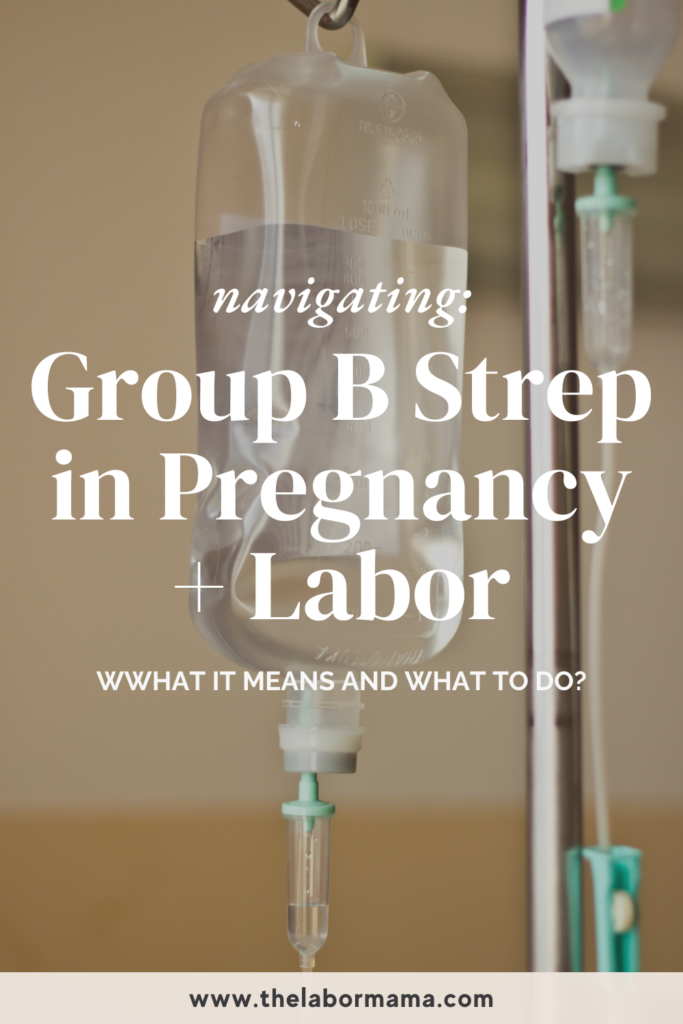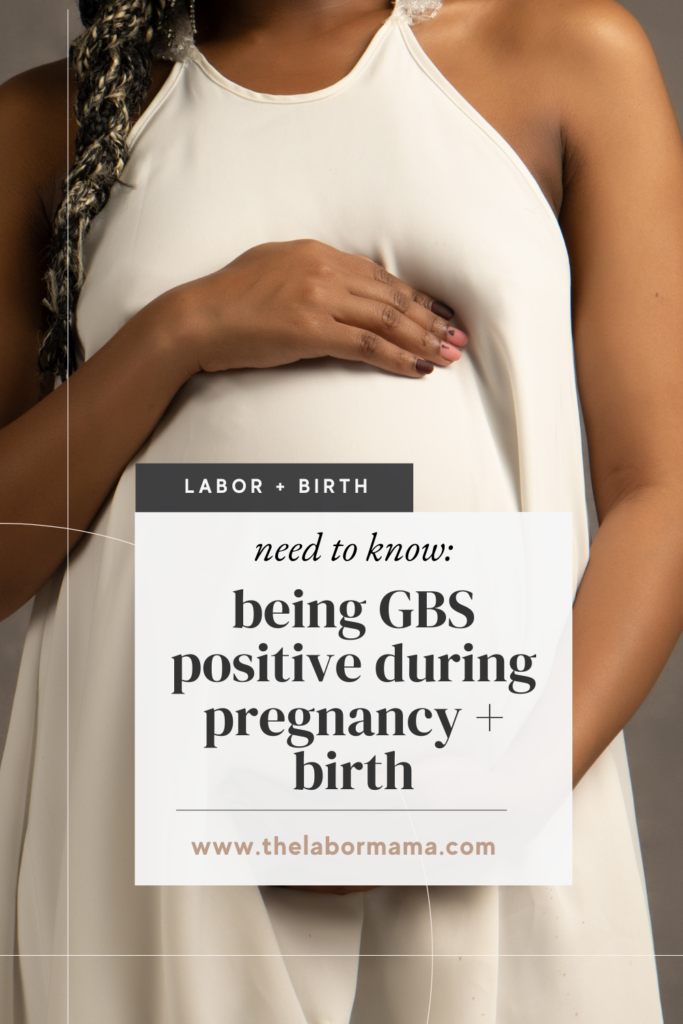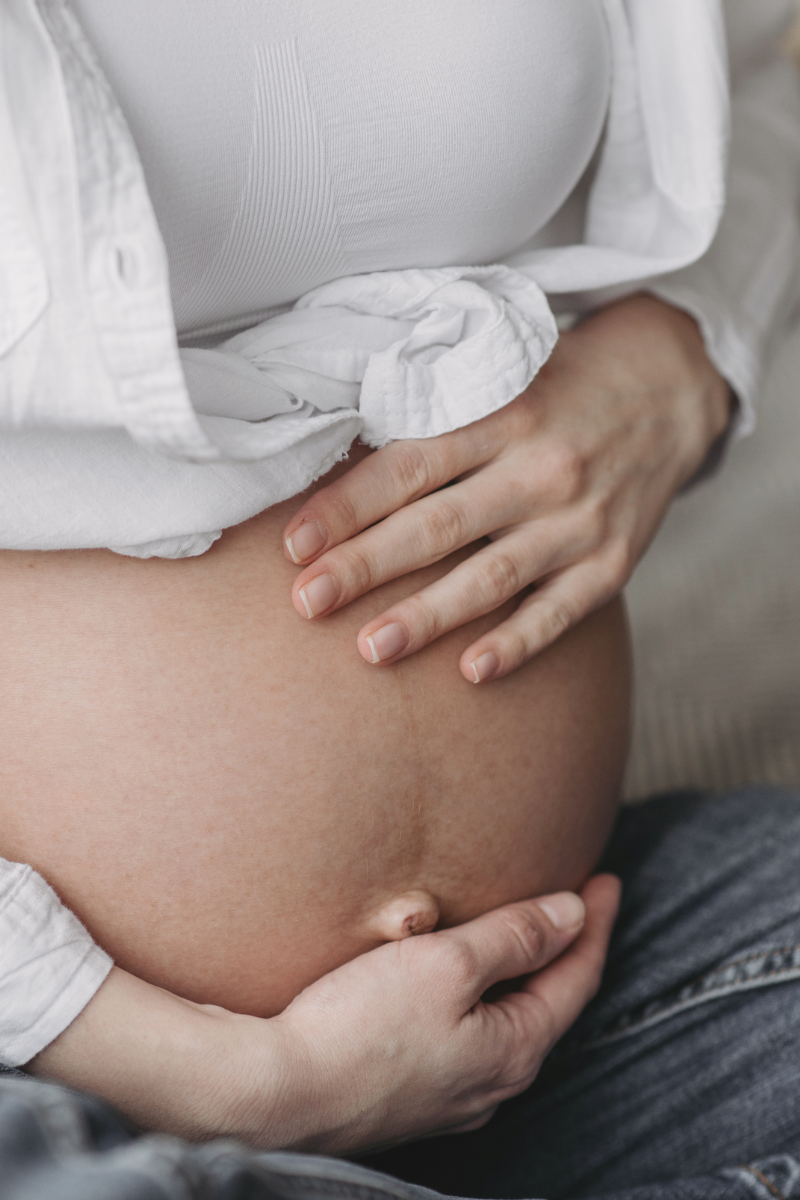If you are pregnant right now, there is a good chance that you have group B strep (GBS) screen coming up. If you’ve been pregnant, I’m going to guess that you definitely remember this screen! And if this all sounds foreign, or you’re saying “yah, can you please explain to me what this is all about?” – I got you! As a labor nurse, I’ve seen tons of mamas walk this story (it’s really common), so you definitely need to understand what group B strep in pregnancy and labor is and what it might mean for you and your baby!

Who is The Labor Mama and Why Am I Here?
Hey friend! I’m Lo – also known around here and social media as The Labor Mama. I’ve spent my nursing career in labor, delivery, and postpartum, have birthed 4 of my own babies, have labored thousands of mamas at the bedside, have taught hundreds of students online, and have even delivered a few speedy little babies with my bare hands (oops).
Here at TLM, I offer online classes to empower you the way everyone should be. The education + support I offer gives you experience, evidence, and empathy; you’re getting all of my years of “clinical” RN knowledge, beautifully combined with my real experiences as a mama and a nurse. These are not your average hospital classes (those won’t do it, I promise), and honestly, birth, postpartum, and breastfeeding don’t follow a textbook or protocol anyway. You need to know so much more than that!
If you want to connect with me further, head to Instagram. There are hundreds of thousands of us over there learning together daily.
A note: This post may include affiliate links. This means if you make a purchase after clicking a link, I will earn a small commission (thank you)! Rest assured, this comes at no additional cost to you. You can read TLM’s full disclosure here.
What is group B strep?
Group B strep (GBS) is a streptococcus bacteria that can commonly inhabit the vagina or rectum. It is normally found in about 25% of all healthy, adult women (aka – it’s not weird if you screen positive)! GBS is not some sort of “contagious” thing, nor is it like an STI or virus contracted from sex, something you touch, “germs” from another, etc.
Will you know that you’re positive? Very likely – nope! It is actually super rare (I’ve never even heard of this) to know until the screening test during pregnancy comes back and tells you that you are! There is no clear way to avoid it, nor is there a way to say which pregnancy (if any) you will or won’t test positive.
Why does GBS during pregnancy and labor matter?
Though being GBS positive(or “colonized”) rarely has an effect on the maternal body, the bacteria can pass from the maternal body to the baby during labor and delivery. When a baby picks up this GBS infection, it can cause incredibly severe complications, including death. To prevent this possibility, antibiotics are highly recommended and standardly given during labor to protect the baby. Infants born to those who do not receive adequate treatment have a 1 in 200 chance of becoming infected (that’s about 1-2 %). However, when you do receive adequate antibiotic treatment, the chance of infection for baby falls substantially, to 1 in 4,000.
Types of GBS Infection
Early-Onset GBS vs Late-Onset GBS
There are actually 2 types of GBS disease. Early-onset GBS infection occurs in the first week of life (usually within 12-48 hours) and late-onset GBS infection can occur from the first week until about three months of life. The CDC reports that about half of all cases of GBS infection in the US are early-onset; other sources report that early-onset GBS makes up closer to 60-75% of cases.
It is not totally clear what causes a newborn to develop late-onset GBS. ACOG states that the infection “is usually caused by contact with the mother after delivery if she is infected. But it can come from other sources too, such as contact with other people who have GBS.” Unfortunately, antibiotics during labor do not protect against late-onset GBS, they only offer protection against early-onset (but again, late onset is really rare)!
If you are GBS positive when you deliver, and especially if you do not get adequate antibiotic treatment before baby is born, your RN will be assessing your baby for any signs of GBS infection.
But you should know signs and symptoms so you can keep an eye on them as well, including when you are at home!
Symptoms of early-onset GBS include:
- Breathing problems
- Fever
- Difficulty feeding
- Irritability
- Lethargy (which means they’re hard to wake/limp)
Symptoms of late-onset GBS include:
- Lethargy
- Coughing and congestion
- Poor feeding patterns
- High fever
- Seizures
Would you like my free third trimester guide to help you prep, plan, and pack? I’d love to send it over. Grab it right here.
How does GBS infection impact my baby?
I know, 1 in 200 sounds pretty rare and you may be wondering if antibiotics really are necessary. But when babies have GBS infection, it can quickly become life threatening, leading to pneumonia, meningitis, or sepsis. The infection is also more dangerous for premature babies. Even with treatment, approximately 5% of babies with GBS infection will die. Infection can also lead to issues later in life, including cerebral palsy, hearing problems, learning issues, and seizures.
Does being GBS positive impact me?
I did mention briefly that GBS rarely impacts the maternal body, particularly when not pregnant and/or in labor. Remember, this is a “normal” and naturally occurring bacteria!
However, it is important to know that very occasionally, being GBS+ can lead to infection, including UTI’s, uterine infection, or chorioamnionitis (an infection of that chorion membrane that surrounds the baby) during labor. If you’re ever experiencing any signs of infection (like fever or pain in your abdomen), call your doctor.
Can I prevent GBS infection?
You may hear that taking probiotics during pregnancy can prevent GBS colonization. But so far, this has not been proven to be true and I know a ton of moms who have done this, eaten all the Greek yogurt, etc. and are still positive during their screen!
However, many figure it’s also a “why not try” type scenario, so you can definitely run it by your provider if you want to. My midwives have always said go for it; these are the ones I use.
How is the GBS test done?
So, how is the GBS screening done? The test can sound a little alarming, but it’s really quick, I promise. Around the 35-37 weeks of your pregnancy, your provider will take a quick swab (like a really long Q-tip) of your vagina and rectum. That swab is sent to a lab for testing. The results are usually back pretty quickly, within a few days, and your provider can let you know what those are.
Some providers will feel comfortable letting you collect your own sample. If you would prefer this and if they don’t offer, please ask (I’ve always done my own ??)!
*Not every country standardly screens for GBS. The United States does.
The GBS screen is done towards the end of pregnancy and as near as possible to being full term so you can be sure about whether or not you are colonized. Interestingly, GBS colonization can kind of come and go, so if you were screened early in pregnancy, it’s possible that later in pregnancy you would no longer be positive! This also means that once you are GBS positive, you are NOT always positive. I have had lots of patients and friends have different results with different babies.
Sometimes, a positive GBS result shows up during an urine screen or culture in pregnancy. Most often, when this occurs you are then considered positive or colonized the whole pregnancy and you won’t be screened later on. The recommendation in this case would then be that you receive IV antibiotics during labor.
Does GBS matter for a cesarean birth?
A quick note that mamas with a planned cesarean will still be tested for GBS! If your water breaks before your c-section, you will likely get antibiotics. And if your waters remain unbroken, it is still important to know your results so baby can be monitored for symptoms after birth.
What if your GBS status is unknown during birth?
Every once in a while, a baby may deliver before the results come back (or be a preterm birth). When a GBS status is unknown, it is standard to treat you for antibiotics as if you were GBS positive. There are also times that treatment is recommended, regardless of test results. Here are those reasons:
- You had a previous baby with GBS infection
- You had GBS present in your urine at any point during your pregnancy
- Your GBS status is unknown and you go into labor, especially if before 37 weeks, you develop a fever, your water has been broken >18 hours, or your urine tested GBS+ in a prior pregnancy
What GBS positive means for your labor?
Ok, so you’re GBS +. Now what? As mentioned, the strongly recommended plan of care for a GBS+ person is antibiotic treatment during labor. Unless there is an allergy, the antibiotic given is usually a “-cillin” medication – penicillin or ampicillin are common. The medication is given via your IV, usually as one dose as soon as you get admitted for labor and then an additional dose every 4 hours until delivery. The hope is usually that you get at least 2 doses in before baby is born.
GBS bacteria can grow back quickly, so that is why the medication is continually given until the baby is born. When you receive adequate treatment, which is usually 2 doses 4 hours apart, the chances of the baby picking up GBS infection fall to 1 in 400,000.
Does this mean you’re hooked to an IV?
Being GBS positive and choosing the antibiotics does NOT mean you have to be hooked up to an IV the whole time. Not at all! Usually, the antibiotics take about 30 minutes to go in. Once they’re done, that IV line can be disconnected (unless you’re hooked up to something else for some other reason).
What happens if I don’t get the antibiotics?
So, what if you have the baby before you get all of the antibiotics? This can be one of the toughest parts of being GBS positive! It is already hard to know when to head to your birth place, and then you have to factor in being at least a few hours early so you can receive your antibiotics. I recommend you talk with your provider about their specific recommendation for you. If your water breaks, they may wish you come in right away. For a first delivery, they may feel comfortable with you waiting to come in until you are in strong, regular labor. But, if this is a subsequent baby or you have a history of quicker labors, they may prefer you come in sooner rather than later, just in case your labor moves really quickly.
I’d chat all of this through at one of your prenatal appointments leading up to labor, but go ahead and give your provider a call when your contractions begin or when your water breaks just to make sure you both still feel good about the plan of care.
What about after the birth? Most hospitals also ask that you stay 48 hours post birth if you do not get adequate antibiotic treatment. This allows them to keep an eye on baby and assess for any signs of early-onset infection. If you don’t want to stay, it’s possible the hospital would discharge you as “AMA (against medical advice)” and your insurance won’t cover your birth! I don’t share that to scare you, but because I want you to know about that and not be surprised after the fact!
Group B strep antibiotic impact after birth
Having GBS during birth is super common – I hope you picked up on that! And there is zero indication that you did anything wrong if you screen positive! But one thing some moms are bummed about is the impact of antibiotics on their body and baby’s body. There is some research that shows that receiving antibiotics during labor can mess with production of healthy gut bacteria in your newborn (for a couple of months). After about 2-3 months, the guts of babies who had antibiotics and those who did not look the same – but there are some impacts those first weeks.
There is also some other research (that is super new, non conclusive, and has tons of unknowns still) that indicates that a delay in the development of the healthy gut microbiome *might increase the risk for allergies, obesity, or bowel diseases later in life.
Antibiotics can also temporarily mess with your gut microbiome too, so that’s another part of the conversation too.
What you can do after antibiotic use?
While I’m NOT suggesting you deny antibiotics for GBS colonization (I feel that the risks of infection are > than the risks of temporary antibiotic use), I do want you to know you do have a choice! And if you’re wondering if anything can help after you do choose to have antibiotics, there are a few things that can help our baby’s gut and yours:
- Breastfeeding: If you’re able, skin to skin and breastfeeding! Colostrum (including anything you’ve collected prenatally)/breastmilk support the development of that healthy microbiome for baby!
- Probiotics: Both you and baby can consider taking probiotics after birth to restore or encourage microbiome development. Run that by your provider if you’re interested!
The takeaway on group B strep in pregnancy and birth
Does that help? I so hope it does! Too often, mamas don’t know this screen is coming and then we’re jut kind of left wondering what was that for and why do I suddenly need antibiotics? I don’t want it to feel that way for you, so I hope this answers a ton of your questions, that you recognize the reasons behind the antibiotic recommendation, and that you know how to navigate your birth and your postpartum a little better.
Did you already understand all this? Have you been GBS positive? How’d it all go? Let me know in the comments! xx- Lo

More resources (and freebies!) for you to take a peek at:




